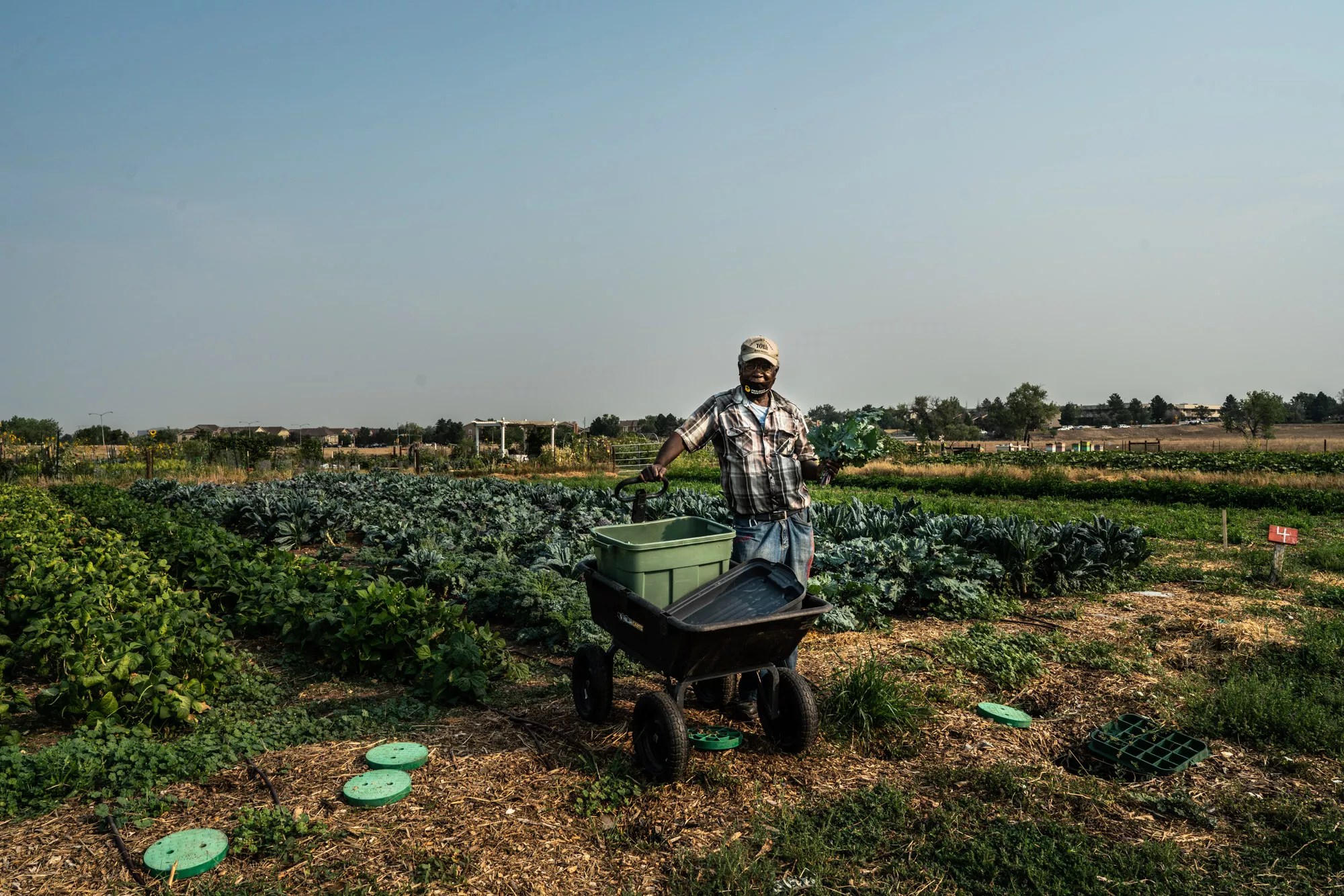
Samantha Hines

Audio By Carbonatix
Farmers’ market season is back. No matter your neighborhood, you can find local produce and handcrafted goodies near you. In Farmers’ Market Finds, recipe developer and freelance writer Ashlee Redger highlights some standout local farmers’ market vendors and dishes up a recipe using their goods.
Vendor: DeLaney Community Farm
Where to find it: Produce and plant starts from DeLaney Community Farm are available every Saturday at the City Park Farmers Market (look for the black and yellow Project Worthmore tent).
For more info: Visit projectworthmore.org/programs/delaney-community-farm/
About the business: According to the Colorado Refugee Services Program, more than three thousand new refugees entered Colorado between October 2021 and September 2022. For over a decade, Project Worthmore has been striving to provide life-changing resources to both new and previously resettled folks in the Denver metro area. This year, it is bringing its mission to a new scene: the farmers’ market.
Project Worthmore was founded by Frank and Carolyn Anello in 2011. It has grown to encompass six major initiatives that include language classes, help for navigating institutional services and, recently, a new $2 million dental facility in Aurora that helps to serve over six thousand members of the refugee community. Frank says Project Worthmore has “lots of partnerships” to support its mission, like working with We Don’t Waste and Food Bank of the Rockies to distribute around ten tons of culturally familiar, nutritious ingredients through its Yu Meh Food Share program every month.
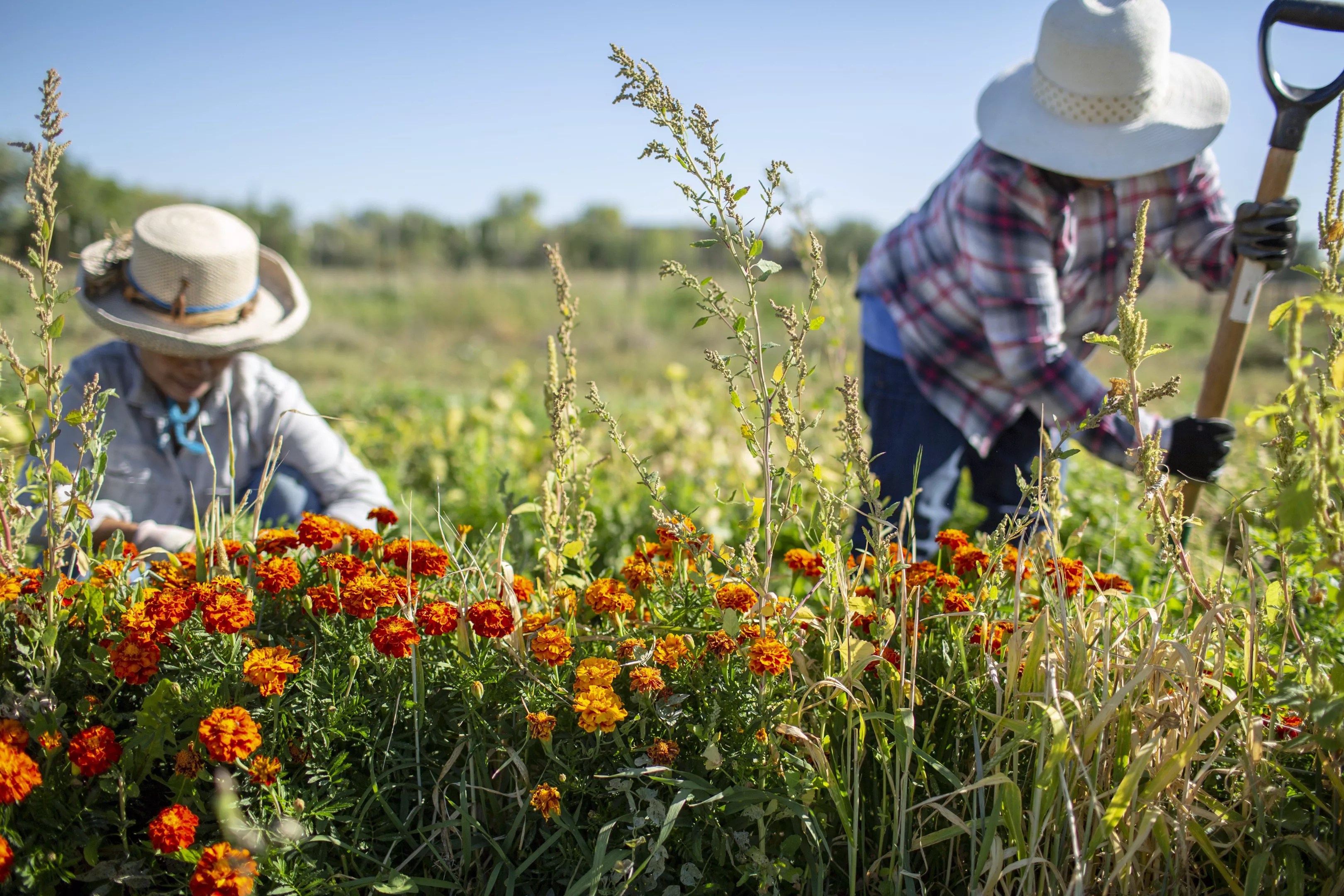
Project Worthmore offers employment, community and fresh produce to refugees through DeLaney Community Farm.
Ryan Roco
DeLaney Community Farm is another collaboration that Project Worthmore has established with Denver Urban Gardens and the city of Aurora. The farm itself is a 158-acre historic site at the corner of South Chambers Road and Alameda Parkway. For the past six or seven years, Project Worthmore has managed the daily operations of the five-acre growing portion of the land. The DeLaney team – which includes five refugee staff members, three from Somalia and two from Myanmar – grows over a hundred different varieties of plants according to Frank, including squash, tomatoes, peppers, leafy greens and root vegetables. Until now, most of that produce was distributed through the farm’s CSA program ($650 per membership) as well as to three restaurant partners, Annette, Lucina Eatery & Bar and Coperta. Starting in June of this year, though, fruits and vegetables from DeLaney Community Farm are also available every Saturday at the City Park Farmers Market.
Hailstorms at the beginning of the growing season have delayed a lot of the early produce from DeLaney Community Farm, so the Project Worthmore stand will have herb and veggie plant starts for the next few weeks while they tend to upcoming harvests. Through the farmers’ markets, Project Worthmore hopes to share more of its work with the greater Denver community and give its farmers a chance to practice another side of the business.
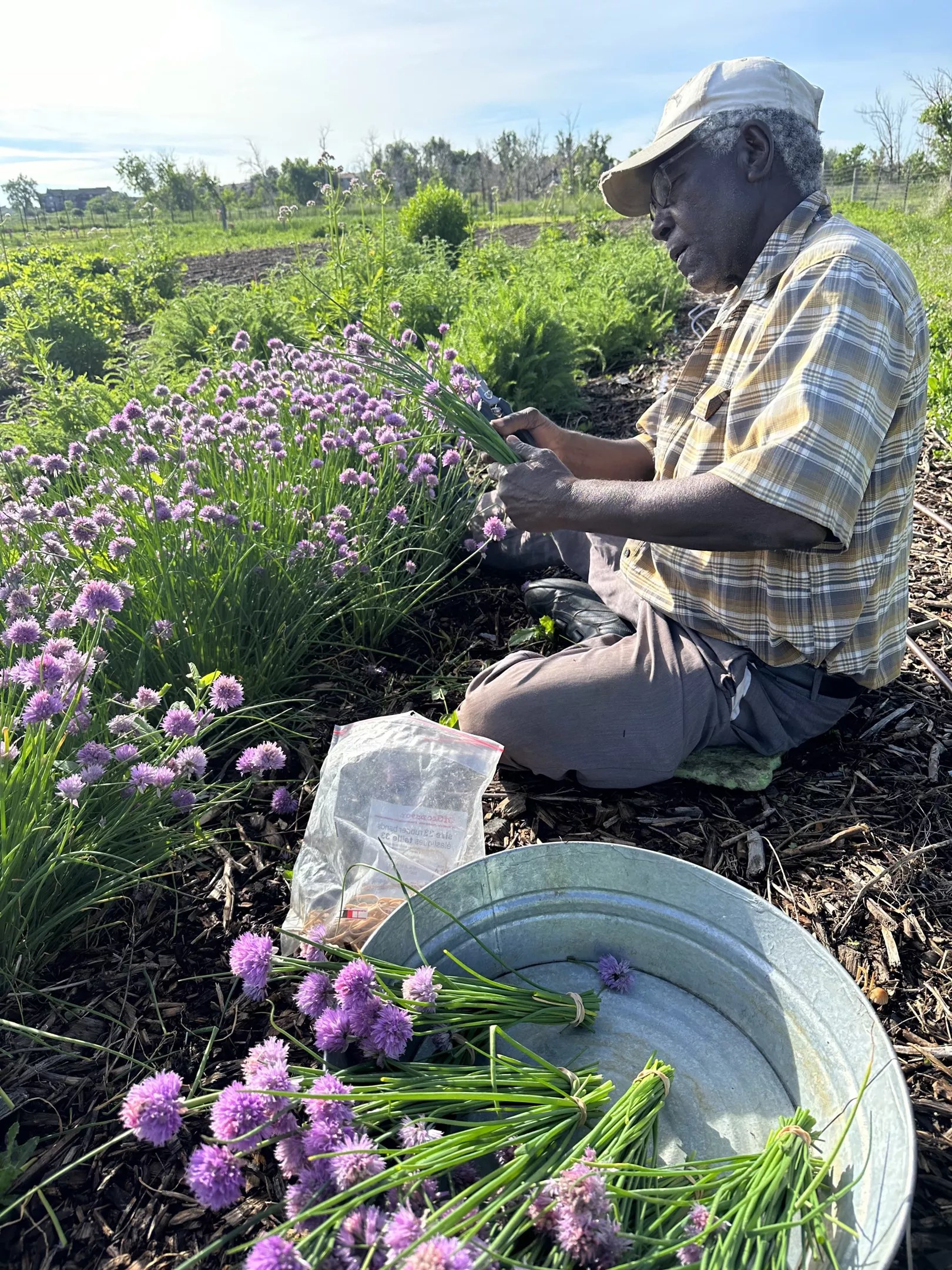
Hamadi, seen here harvesting chives for the CSA program, is one of the refugee farmers at DeLaney Community Farm.
Dayna Kozlowski
Buying fresh vegetables is not the only way to get involved with DeLaney Community Farm. In addition to individual volunteering opportunities, there are corporate teambuilding slots set aside every month which include an authentic Burmese meal made using produce from the farm. It is also the location of Project Worthmore’s First Harvest Music Festival, which is held every year around June 20 to celebrate World Refugee Day. The annual event offers carnival games, food trucks and live music for hundreds of participants. Tickets will be available soon for the upcoming Dinner at DeLaney fundraiser on August 19. Chefs from Uchi will prepare the food featuring seasonal produce from the farm. The guest count will be limited, so keep an eye out on Project Worthmore’s event page for more information and to reserve your table.
How to use your produce: In addition to some plant starts, I was lucky enough to snag a tangle of garlic scapes from the DeLaney Community Farm stand last weekend. Scapes are the stems of hardneck garlic which are trimmed from an immature plant to encourage it to put more energy into growing its garlic bulb (rather than flowering). They have a delicate garlic flavor and a famously brief season. This was my first time using scapes, so my goal was to preserve them so I could enjoy the aromatic tang and crisp texture for as long as possible. Enter: pickled garlic scapes. I kept it simple because honestly, this method works for just about any crisp veggie and you can play around with spices to fit your taste. Try it with scapes if you can get them, or substitute with cucumbers, green beans or radishes.
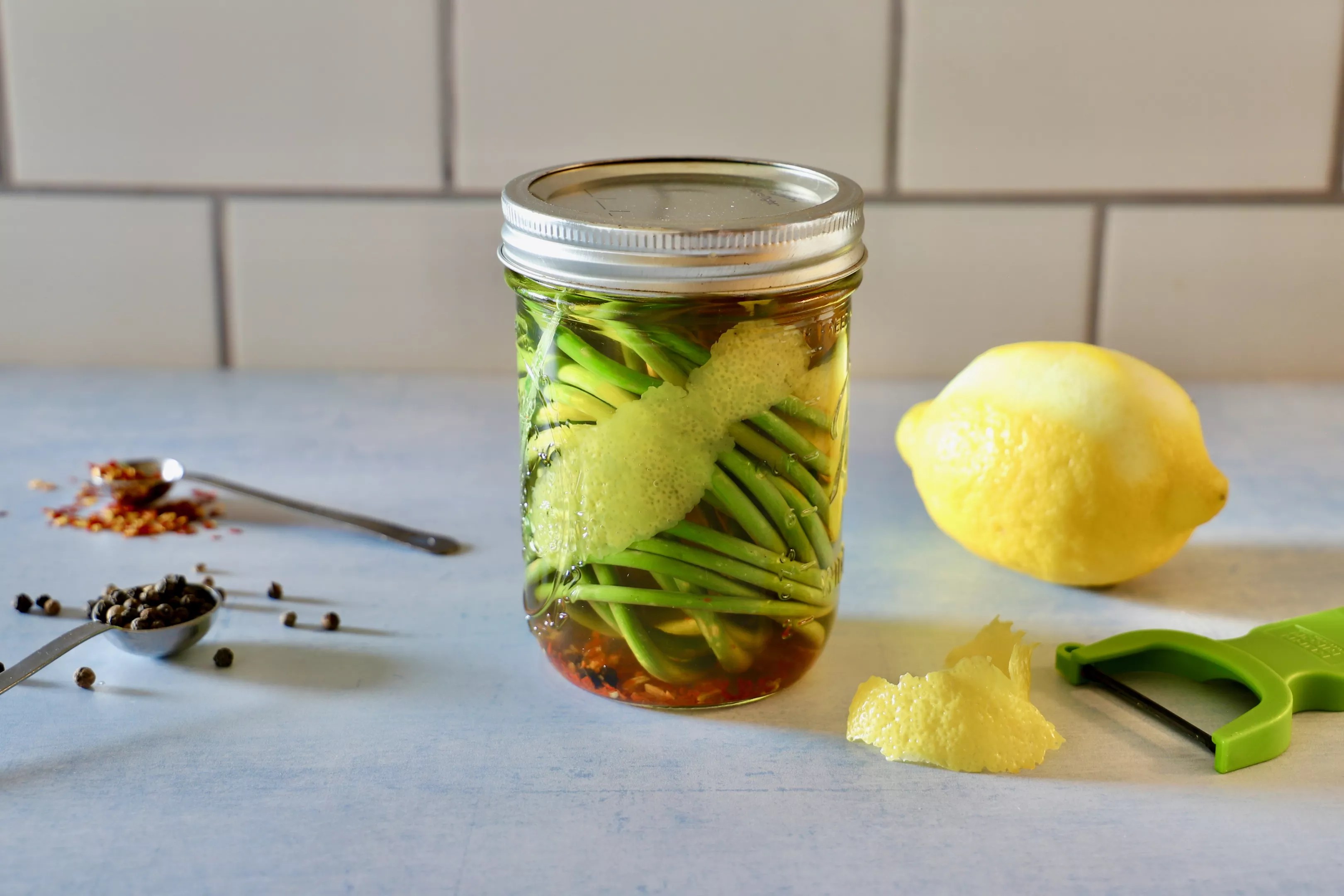
Pickle fresh scapes for a garlicky, tangy addition to salads, sandwiches and relishes.
Ashlee Redger
Pickled Garlic Scapes
The brine recipe makes enough to fill about one pint jar of vegetables. You might have some brine leftover, depending on how tightly you pack the scapes into the jar. If you’re using a quart jar or can’t fit all of your vegetables in one jar, you will need to double the brine recipe. The most important thing is to cover the vegetables completely in brine.
For the pickles:
- 1 bunch garlic scapes (about 12 scapes), thoroughly washed and thick ends trimmed off
- Optional: 1 dried chile of choice, bay leaf or strip of lemon peel
- 1 clean wide-mouth pint jar with a nonreactive, tight-fitting lid
For the brine:
- 1 cup white wine vinegar (you can also use white distilled or cider vinegar)
- 1 cup water
- 1 tablespoon kosher salt
- 1 tablespoon granulated sugar
- Optional: 1 teaspoon black or pink peppercorns, cumin seeds, dill seeds, mustard seeds, red pepper flakes, coriander seeds, fennel seeds and/or turmeric (use what you have on hand and adjust quantity to taste)
- Gently twist a few whole scapes at a time into loose circles, then press them into your clean jar. You can pack as many scapes that will fit into the jar at a time without breaking or bruising them, but try to leave about an inch of space at the top.
- Add chile, bay leaf or lemon peel (if using) into the jar with the scapes.
- Combine all of the brine ingredients (including any optional spices) in a small pot and bring to a boil over medium-high heat, stirring to dissolve the salt and sugar.
- Pour the hot brine into the jar, leaving about half an inch of space at the top. Screw the lid on, then let it cool at room temperature for about thirty minutes. Store pickled scapes in the refrigerator for up to a month.
- Thinly slice the whole pickled scapes and use on sandwiches, top avocado toast or sprinkle on salads. Or, just use them as you would shallots or garlic cloves. Leftover brine can go in vinaigrettes and martinis, or you can stir a splash into sour cream for an easy dip.
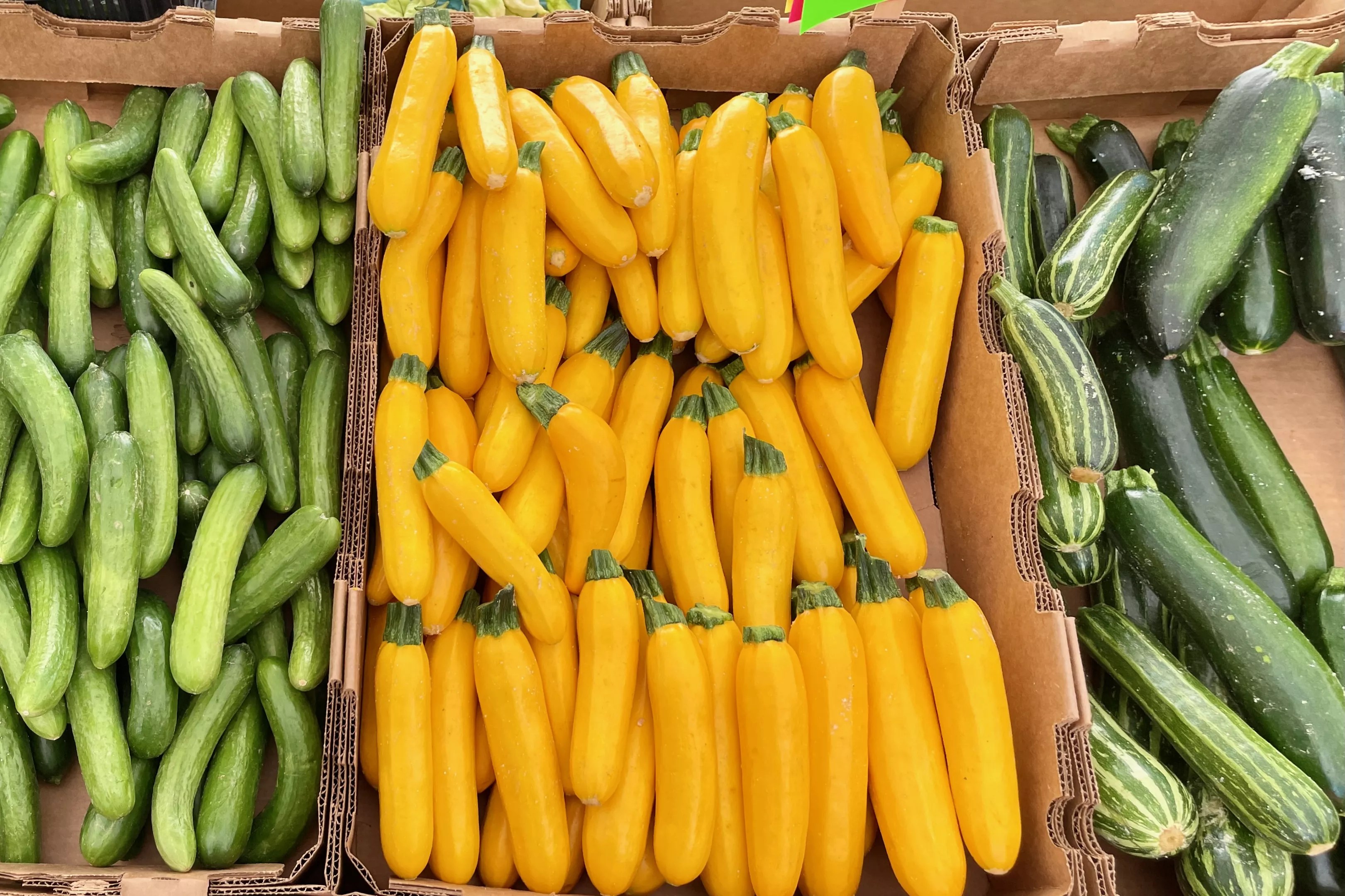
Check the produce stands for peak-season summer squash, strawberries and cherries this month.
Ashlee Redger
Bonus Farmers’ Market Finds: After a rainy start to the season, farmers’ markets are now in full swing. Peak produce season happens in mid-July, so plan for busy vendor stands and full tote bags. Go early to avoid crowds or, even better, support your local neighborhood market. Either way, here is what’s hot at markets right now:
- Early summer is the height of cherry season. Snack on them fresh or freeze them (pre-pitted) for pies and desserts later in the year. Apricots, strawberries and summer squash are ready, too.
- There are a lot of sauce and condiment vendors these days and Not Bad Cooks is one of the best. Ash, the company’s founder and cook, creates jars of creamy Happy Days vodka sauce, garlic-packed Jimichurri and more from fresh, simple ingredients. Grab a few from the City Park or South Pearl farmers’ markets for dinner shortcuts, then freeze what you don’t use. Bonus: the Not Bad Cooks Instagram has story highlights with ideas and recipes for each sauce.
- Don’t forget to stop at the mushroom stands for locally cultivated and foraged fungi. There are plenty of producers to choose from, including Mile High Fungi and Hazel Dell Mushrooms. Their offerings will vary week to week, so check the stands for gems like lion’s mane or lobster ‘shrooms.